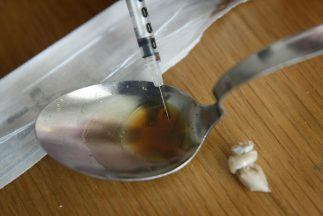Health experts are investigating the risk of acute pancreatitis from injections for weight loss jabs such as Ozempic, Mounjaro, and Wegovy.
Patients have reported being hospitalised with inflammation of the pancreas suspected to be related to glucagon-like peptide-1 receptor agonists (GLP-1 medicines), such as Ozempic and Mounjaro.
Sometimes referred to as “skinny jabs”, they are licensed for both weight loss and Type 2 diabetes.
STV News spoke to a GP earlier this year who said the weight loss drugs are the most “transformational” she has seen in her 20-plus-year career.
The drugs have been helping thousands of people at risk of poor health due to obesity to lose huge amounts of weight rapidly. Many are also prescribed weight-loss drugs privately.
Common side effects such as nausea and headaches are well documented, and users are provided with guidance about what to do if they experience them.
But dramatic weight loss can also result in sagging or loose skin. Those who want the excess skin to be removed can face issues.
In response, the Medicines and Healthcare products Regulatory Agency (MHRA) and Genomics England will begin an investigation into acute pancreatitis through its Yellow Card Biobank.
Healthcare professionals are also being asked to help recruit for the study by reporting Yellow Cards on behalf of patients experiencing acute pancreatitis while taking the medicines.
What is acute pancreatitis and what are the symptoms?
Acute pancreatitis is an inflammation of the pancreas and can be “serious” for some patients.
The pancreas is a small organ, located behind the stomach, that helps with digestion.
The main symptom of the condition is severe pain in the stomach that radiates to the back and does not go away.
Most people with acute pancreatitis start to feel better within about a week and have no further problems.
But some people with severe acute pancreatitis can go on to develop serious complications.
It is different to chronic pancreatitis, where the pancreas has become permanently damaged from inflammation over many years.
The most common symptoms of acute pancreatitis include: suddenly getting severe pain in the centre of your abdomen, feeling or being sick, and a high temperature of 38C or more, like a fever.
Treatment for acute pancreatitis aims to help control the condition and manage symptoms.
This usually involves admission to hospital. Patients may be given fluids directly into a vein (intravenous fluids), pain relief, liquid food through a tube in your tummy, and oxygen through tubes in your nose.
How many cases of acute pancreatitis have been linked?
Recent estimates suggest that about 1.5 million people in the UK are taking weight loss jabs.
Health officials have suggested that they can help to turn the tide on obesity, but have stressed they are not a silver bullet and do come with side effects.
Since the drugs were licensed, there have been hundreds of cases of acute and chronic pancreatitis among people taking GLP-1 medicines.
181 cases were reported of acute and chronic pancreatitis linked to tirzepatide – the active ingredient for Mounjaro. Five people died.
There were 116 reported reactions of this kind linked to liraglutide, one of which was fatal.
113 cases of acute and chronic pancreatitis linked to semaglutide – the active ingredient for Ozempic and Wegovy were reported. One person died.
101 reported reactions of this kind were linked to exenatide, and three people died.
There were 52 reported reactions of this sort linked to dulaglutide and 11 reported reactions linked to liraglutide. No fatalities were linked to either drug.
These cases are not confirmed as being caused by the medicines, but the person who reported them suspected they may be.
Dr Alison Cave, MHRA chief safety officer said: ”Evidence shows that almost a third of side effects to medicines could be prevented with the introduction of genetic testing. It is predicted that adverse drug reactions cost the NHS more than £2.2bn a year in hospital stays alone.
“Information from the Yellow Card Biobank will help us to better predict those most at risk of adverse reactions – enabling patients across the UK to receive the safest medicine for them, based on their genetic makeup.
“To help us help you, we’re asking anyone who has been hospitalised with acute pancreatitis while taking a GLP-1 medicine to report this to us via our Yellow Card scheme.
“Even if you don’t meet the criteria for this phase of the biobank study, information about your reaction to a medication is always extremely valuable in helping to improve patient safety.”
Professor Matt Brown, Chief Scientific Officer of Genomics England, said: “GLP-1 medicines like Ozempic and Wegovy have been making headlines, but like all medicines, there can be a risk of serious side effects.
“We believe there is real potential to minimise these, with many adverse reactions having a genetic cause.
“This next step in our partnership with the MHRA will generate data and evidence for safer and more effective treatment through more personalised approaches to prescription, supporting a shift towards an increasingly prevention-focused healthcare system.
“Although infrequent, acute pancreatitis has been reported with GLP-1 medicines. This can be serious. The main symptom of this is severe pain in the stomach that radiates to the back and does not go away. Anyone who experiences this should seek immediate medical help.”
When a Yellow Card report is received, the MHRA contacts patients to ask if they would be willing to participate in the study.
Patients will be asked to submit more information and a saliva sample, which will be assessed to explore whether some people are at a higher risk of acute pancreatitis when taking these medicines due to their genes.
Follow STV News on WhatsApp
Scan the QR code on your mobile device for all the latest news from around the country


 iStock
iStock
























